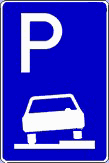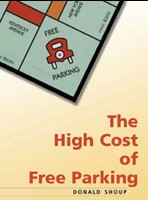Proposed Parking Permit Fee increases

The papers report that the Williams Administration has proposed a jump in fees for parking permits, an additional increase for the second and third cars in a household, and a limit to three permits per household. There is a hearing on the proposed changes this Thursday at 2 pm at the District Building, 1350 Pennsylvania Ave. NW.** (See below)
Although I won't be testifying, I think this is a good idea. In fact, it was first proposed in the Strategic Neighborhood Action Planning process in 2001 in the H Street neighborhood, which also proposed that bigger vehicles be charged more for parking permits than smaller vehicles, and I'm not sure if that's part of the legislation. One of the reasons for loss of spaces is the increased number of SUVs parking on District streets.
Ironically, tomorrow, Donald Shoup, author of the recently published book, The High Cost of Free Parking, will be speaking as part of the DC Department of Transportation's "Great Streets Symposium." (Click here to read the first chapter.)

I have written about Dr. Shoup's work in a number of blog entries including "High Cost of Free* Parking Revisited and Car Sharing in DC," and "The High Cost of Free Parking," which lists some of Shoup's conclusions:
• Curbside parking in many cities is too cheap. Low rates on parking meters encourage people to cruise the streets to avoid costlier parking lots and garages
• Cities and suburbs require too many parking spaces around malls, apartments and office buildings. That wastes land that could be put to better use, and for much of the year, hundreds of spaces sit vacant.
• Shoup says cities mismanage parking supplies and pricing in an attempt to provide free or cheap parking to a car-obsessed nation. When developers are forced to build extra parking, their costs soar — and get passed on to consumers. "
and quotes San Fransico Planning Official Amit Ghosh who stated that 16% of public space in SF is comprised of parking spaces on the streets!
It is for these reasons, not the ridiculous quote by Vince Morris, the Mayor's spokesperson, who said new rates would bring "fees more in line with other big cities. That helps us make sure we're competitive with other cities."
This has nothing to do with other cities. It has to do with developing broad pro-urban policies in the District of Columbia. Car owners are subsidized by their cheap access to street parking spaces (compare the price to parking in a Downtown garage for one day...). It's not reasonable for the city generally, and for non-car owners specifically, to continue to subsidize these costs.
__________________________
From the DC City Council Calendar:
2 PM, ROOM 412, PUBLIC ROUNDTABLE, COMMITTEE ON PUBLIC WORKS AND THE ENVIRONMENT, Carol Schwartz, Chairperson
Agenda item:
"Omnibus Parking Amendment Act of 2005," Bill 16-536. To amend Title 18 of the District of Columbia Municipal Regulations to restore reciprocal parking privileges to persons with disability parking tags or placards issued by other jurisdictions; to authorize the establishment of time limitations at such reserved spaces, to provide that such time restrictions be not less than twice the time established for the nearest non-reserved parking space; to provide for a study concerning the number, placement and accessibility of such spaces and meters; to require that persons with disability parking tags or placards comply with the time at all parking spaces once the reserved spaces are established in accordance with the study, subject to possible exceptions established by rulemaking; to amend Title 18 in the District of Columbia Municipal Regulations to limit household to no more than 3 residential permit parking stickers and institute a progressive fee structure for residential parking; to amend Title 47 of the District of Columbia Official Code to repeal a sightseeing bus license tax; and to amend the District of Columbia Motor Vehicle Parking Facility Act of 1942 to eliminate the Motor Vehicle Parking Agency and its authority over municipal off-street parking facilities.
"Residential Permit Parking Area Amendment Act of 2005," Bill 16-382.
"Parking Enhancement Amendment Act of 2005," Bill 16-383.
Index Keywords: parking: car-culture



0 Comments:
Post a Comment
<< Home